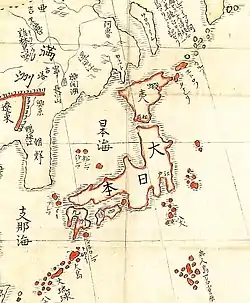Eiryaku
Eiryaku (永暦) was a Japanese era name (年号,, nengō,, lit. "year name") after Heiji and before Ōhō. This period spanned the years from January 1160 through September 1161.[1] The reigning emperor was Nijō-tennō (二条天皇).[2]
| History of Japan |
|---|
 |
Change of era
- February 9, 1160 Eiryaku gannen (永暦元年): The new era name was created to mark an event or a number of events. The previous era ended and a new one commenced in Heiji 2, on the 10th day of the 1st month.[3]
Events of the Eiryaku era
- 1160 (Eiryaku 1): Minamoto no Yoshitomo (1123–1160), was killed in a campaign to overthrow the imperial chancellor, Taira no Kiyomori. Yoshitomo's wife, Tokiwa Gozen was compelled to flee Kyoto with her three sons.[4]
Notes
- Nussbaum, Louis-Frédéric. (2005). "Eiryaku" in Japan Encyclopedia, p. 172, p. 172, at Google Books; n.b., Louis-Frédéric is pseudonym of Louis-Frédéric Nussbaum, see Deutsche Nationalbibliothek Authority File.
- Titsingh, Isaac. (1834). Annales des emepereurs du japon, pp. 191-194; Brown, Delmer et al. (1979). Gukanshō, pp. 327-329; Varley, H. Paul. (1980). Jinnō Shōtōki, pp. 208-212.
- Brown, p. 328.
- Claremont Colleges Digital Library: Archived 2009-02-20 at the Wayback Machine Ukiyo-e, Accession No. 93.6.40.
References
- Brown, Delmer M. and Ichirō Ishida, eds. (1979). Gukanshō: The Future and the Past. Berkeley: University of California Press. ISBN 978-0-520-03460-0; OCLC 251325323
- Nussbaum, Louis-Frédéric and Käthe Roth. (2005). Japan encyclopedia. Cambridge: Harvard University Press. ISBN 978-0-674-01753-5; OCLC 58053128
- Titsingh, Isaac. (1834). Nihon Odai Ichiran; ou, Annales des empereurs du Japon. Paris: Royal Asiatic Society, Oriental Translation Fund of Great Britain and Ireland. OCLC 5850691
- Varley, H. Paul. (1980). A Chronicle of Gods and Sovereigns: Jinnō Shōtōki of Kitabatake Chikafusa. New York: Columbia University Press. ISBN 9780231049405; OCLC 6042764
External links
- National Diet Library, "The Japanese Calendar" -- historical overview plus illustrative images from library's collection
| Preceded by Heiji |
Era or nengō Eiryaku 1160–1161 |
Succeeded by Ōhō |
This article is issued from Wikipedia. The text is licensed under Creative Commons - Attribution - Sharealike. Additional terms may apply for the media files.
